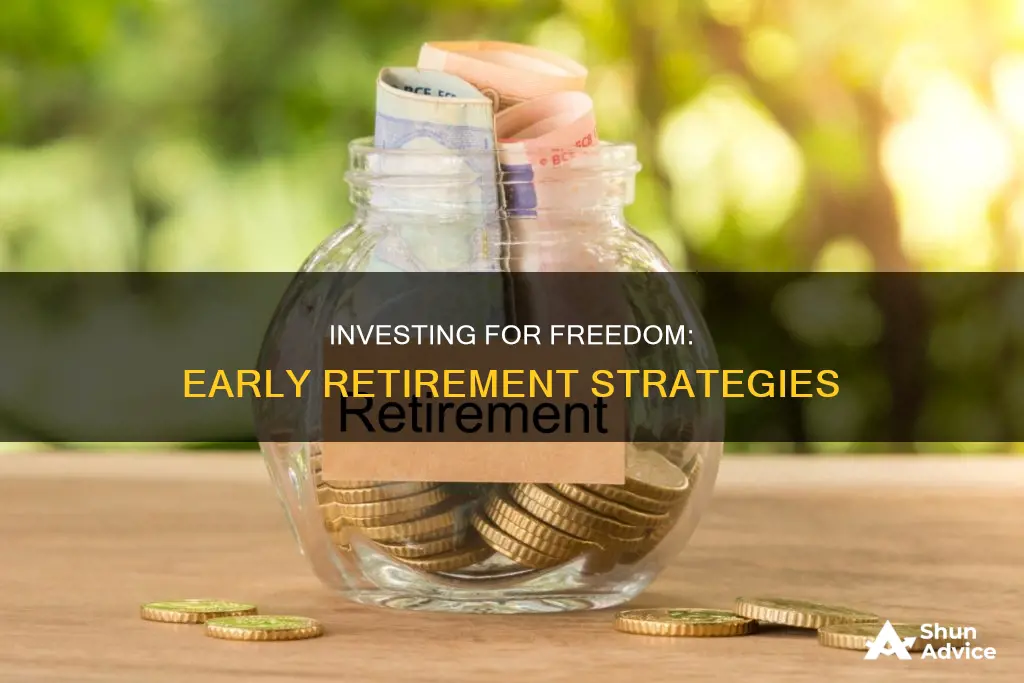
Where to Invest for Early Retirement?
Early retirement is a dream for many, but it requires careful financial planning. The first step is to calculate your net worth by adding up all your assets and subtracting your debts. Next, you need to determine your retirement budget by considering your desired lifestyle, expenses, and income sources.
To achieve early retirement, focus on maximising your income, cutting back on expenses, and increasing your savings and investments. Consider diversifying your income streams with side hustles and optimising your full-time job by negotiating raises and remote work opportunities.
When it comes to investing, a good early retirement strategy is simple and focused on stocks, bonds, and real estate. Look for low-risk investments with guaranteed long-term growth, such as high-yield savings accounts, money market accounts, and certificates of deposit.
Remember to account for inflation and consider the impact of early withdrawal penalties on retirement accounts like 401(k)s and IRAs. It's also crucial to consult with a financial advisor to tailor a plan to your unique circumstances.
What You'll Learn

Calculate how much money you need to retire
When it comes to retirement, there are a lot of variables to consider. How much you need to save for retirement depends on your current income, your age, and the lifestyle you want when you retire.
Many retirement experts recommend strategies such as saving 10 times your pre-retirement salary and planning to live on 70-80% of your pre-retirement annual income. This means that if you make $100,000 annually at retirement, you will need at least $70,000 to $80,000 per year to maintain a comfortable lifestyle after leaving the workforce. This amount can be adjusted based on additional sources of income, such as Social Security, pensions, and part-time employment, as well as factors like your health and desired lifestyle.
A good rule of thumb is to save at least 15% of your pre-tax annual income for retirement. This may vary depending on when you start saving and how much you expect to need in retirement. If you start saving later in life or expect to need a higher percentage of your pre-retirement income, you may want to contribute a greater percentage of your income.
The income a couple needs in retirement depends on several factors, including their current annual income and the lifestyle they wish to maintain. Many experts suggest that retirement income should be about 80% of a couple's final pre-retirement annual earnings.
To retire early, you need to build a sufficient amount of wealth through minimizing debt and maximizing salaries and investments. You can use an early retirement calculator to help you plan. Some additional steps to prepare for early retirement include paying off debts, calculating your necessary income, estimating any additional costs, and adjusting your current budget.
There are several online retirement calculators available that can help you estimate how much you need to save. You can also use some simple formulas to calculate your retirement savings goals. One formula is to divide your desired annual retirement income by 4%, which is known as the 4% rule. This rule assumes a 5% return on investments, no additional retirement income, and a similar lifestyle to the one you have before retirement. Another formula is to save 25% of your gross salary each year, starting in your 20s. This should allow you to accumulate your full annual salary by age 30 and continue to build from there.
Retirement planning can be complex, and it's always a good idea to consult a financial advisor to help you create a plan that is tailored to your specific needs and goals.
Retirement Planning: The American Investment Journey
You may want to see also

Cut back on your three biggest expenses
Cutting back on expenses is a great way to save money for early retirement. Here are some tips to reduce your three biggest expenses:
Housing
The average retiree may still have ongoing property taxes and home maintenance costs, even after paying off their mortgage. Downsizing to a smaller home or relocating to an area with a lower cost of living can significantly reduce these expenses. Paying off your mortgage early can also eliminate one of your biggest monthly bills and free up funds for other expenses or investments.
Transportation
Transportation costs, including car maintenance and insurance, can be reduced by opting for a used car, increasing your deductible, or bundling services with the same provider. If public transportation is accessible, utilising it can further lower your transportation expenses and provide an opportunity to sell any additional vehicles you may own.
Food
Groceries and dining out can be another significant expense. Cooking meals at home, taking advantage of senior discounts, and carefully planning grocery shopping to avoid waste can help cut costs. Additionally, switching to discount grocery stores or buying in bulk from warehouse clubs can also reduce your food expenses.
By focusing on reducing these three major expenses, you can make substantial savings and work towards your early retirement goals.
The Hunt for High Dividend Yields: Strategies for Seeking Out Substantial Returns
You may want to see also

Increase and diversify your income streams
To retire early, it is important to increase and diversify your income streams. Here are some ways to do that:
Optimize your full-time job
Whether you enjoy your full-time job or not, it is currently your primary source of income. Therefore, you should optimize it to ensure you are earning as much as possible. Negotiate a raise, work remotely to save on commuting costs, and maximize all your employee benefits, including commuter benefits, HSAs, and retirement investing account opportunities.
Start a side hustle
In addition to your full-time job, consider starting a side hustle to bring in some extra income. You can make extra money doing anything, such as mowing lawns, walking dogs, babysitting, coding online, tutoring, or delivering food. While some side hustles may be limited by the number of hours you can put in, others can be scaled up and turned into a business. For example, you could mow lawns on weekends or create a mobile app.
Invest in stocks, bonds, and real estate
It is important to invest your money to make it work for you. Focus on stocks, bonds, and real estate, as these asset classes have performed well historically. Additionally, invest in a tax-efficient way to maximize your returns.
Save and invest as much as possible
The more you can save and invest, the faster you will be able to retire early. Consider depositing a certain amount of money into your investment accounts daily, or setting a daily minimum. You can also try to increase your earnings through pay raises and promotions, and then invest those additional funds.
By implementing these strategies, you can increase and diversify your income streams, bringing you closer to your goal of early retirement.
Chase Invest: Understanding Dividend Payments
You may want to see also

Set your savings goals
Setting savings goals is a crucial step in achieving early retirement. Here are some tips to help you define and work towards your savings targets:
Understand Your Retirement Needs
The first step in setting savings goals is understanding how much you need to retire comfortably. This will depend on various factors, such as your expenses, current salary, lifestyle choices, and healthcare costs. It's essential to analyse your current and future expenses and decide how much you can afford to save and invest each month. Financial advisors typically suggest aiming to save around 10 times your current annual salary by the time you retire.
Calculate Your Annual Retirement Spending
To set realistic savings goals, you need to estimate your annual retirement spending. Consider your current monthly expenses and identify areas where you can cut back. Typically, retirees can expect to spend at least 80% of their pre-retirement income monthly. This reduction accounts for work-related expenses such as transportation, meals, and dry cleaning. However, if you plan to travel or take up new hobbies, your expenses may quickly increase.
Determine Your Retirement Timeline
How early do you want to retire? This is a critical question to answer, as it significantly impacts your savings goals. Retiring at 55, for example, requires saving 33 times your annual salary, according to Jon Ulin, a certified financial planner. In contrast, retiring at 65 would mean saving around 13-15 times your annual income. The earlier you want to retire, the more aggressive your savings goals will need to be.
Utilise Online Tools and Calculators
Take advantage of the many online tools and calculators available to help you set and track your savings goals. These resources can provide a more precise estimate of how much you need to save based on your unique circumstances. They can also help you identify areas where you can cut back and maximise your savings.
Consult a Financial Professional
While setting savings goals, consider consulting a certified financial planner or advisor. They can provide personalised advice and strategies based on your income, expenses, and retirement timeline. A professional can help you navigate the complexities of retirement planning and ensure you're on track to achieve your early retirement goals.
Remember, setting savings goals is a dynamic process. Regularly review and adjust your goals as your financial situation changes and as you get closer to your desired retirement age.
Renting vs. Investing: The Financial Dilemma
You may want to see also

Create a simple investing strategy
A good early retirement investing strategy should be simple, focused on stocks, bonds, and real estate, and be executed consistently. You should have both a short-term investing strategy (money you’ll need in the next five years) and a long-term investing strategy (money you’ll need in 10+ years).
While you can invest in anything, only invest in what you understand, and stick with asset classes that have performed well historically like stocks, bonds, and real estate. It’s also essential to make sure your money is working as hard as it can for you by investing in a tax-efficient way. This just means that you invest in your accounts the right way.
To learn more about how to invest for early retirement, check out some step-by-step posts on the best investing strategies, or a book on financial freedom, where a 7-step investing strategy is outlined to help anyone retire early.
Invest in Yourself: Your Greatest Asset
You may want to see also
Frequently asked questions
As a general rule of thumb, financial advisors recommend saving 10 times your current salary by the time you reach retirement age. However, if you want to retire early, you'll need to save a lot more. A good rule of thumb is to save 25-30 times your expected annual expenses. This means that if you spend $50,000 a year, you'll need between $1,250,000 and $1,500,000 to retire.
The three biggest expenses for the average American family are housing, transportation, and food, so focus on cutting back in these areas. For example, you could try house hacking, which involves renting out extra rooms in your home to offset the cost of your rent or mortgage. If you don't need a car, don't buy one. If you do, buy a used car instead of a new one. There are also lots of ways to save money on food, such as making food at home, buying in bulk, and eating less meat.
If you want to retire early, you'll probably need to make more money. You can do this by optimizing your full-time job and starting a side hustle. For example, you could negotiate a raise or work remotely to give yourself more control over your time. You could also mow lawns, walk dogs, shovel snow, babysit, code online, or deliver food.







